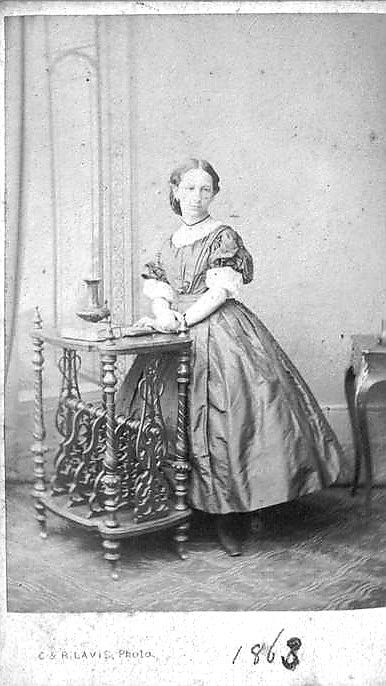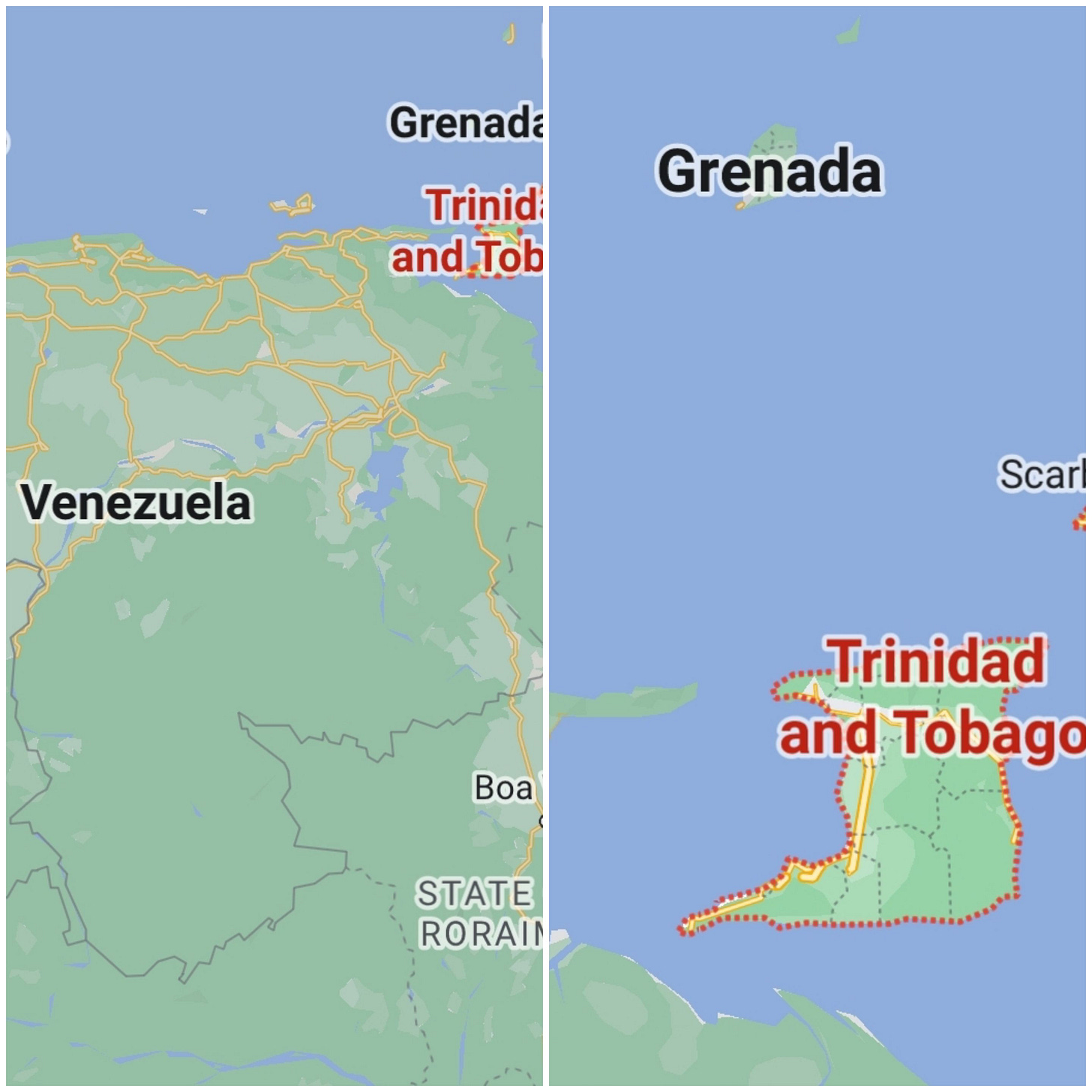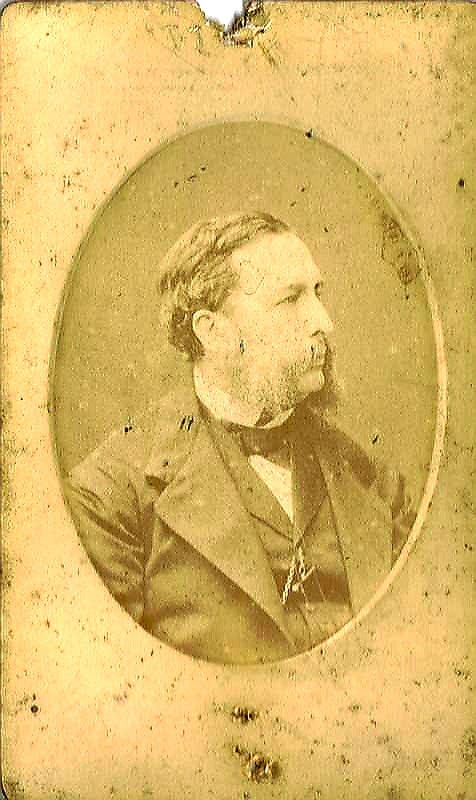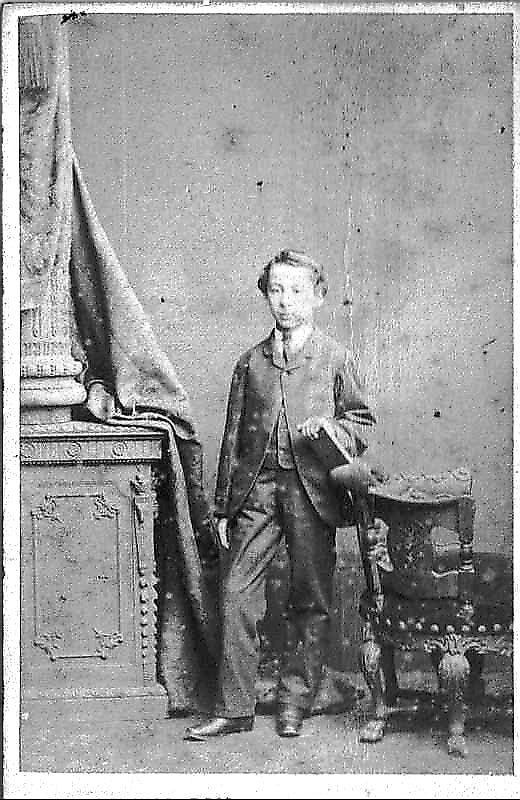Bernard Family History
"Notes written by our dear Auntie Louise Bernard and copied out by F.C.B."
[The author is Stephanie Louise Bernard (1851-1933), sister of Francis Wright Bernard, F.C Bernard's father. All grammar errors are transcribed as written. Date of notes unknown.]
My father's sister, Emma, now living in Trinidad, (widow of Louis D. O'Connor) has told me, that she distinctly remembers when a child, how her own father Raymond Bernard used often to receive the visits of his cousin Bernard de Riveneuve, then living on his estate at Cedros near San Fernando, (which is the 2nd town of importance in the Island of Trinidad). There he lived with his wife and daughter, and only child and very delicate. Raymond always treated his cousin with special deference, calling him “my cousin de Riveneuve”, according to the etiquette of ancient days, and explaining that he was head of the family, belonging to the elder branch. Bernard de Riveneuve's delicate daughter died suddenly when aunt Emma was quite a child. The father shortly afterwards died of grief, and was soon followed to the grave by his wife; the three deaths happening within 18 months. My aunt still recollects the painful impression produced upon her by these deaths, and the grief they occasioned her father, who said: "Now the elder branch of the family is extinct”. Aunt Emma still retains a vivid remembrance of the distinguished appearance and charm of manner of Bernard de Riveneuve, who's striking personality impressed itself on all.
My great grandfather Nicholas Bernard possessed large properties in Granada. He was rich and prosperous and father of two sons and three daughters. When the terrible insurrection of the negroes broke out at the time of the great revolution, the Bernard family escaped from Granada in open boats to Trinidad. They lost all they possessed, and only saved the clothes they stood in. This flight explains the loss of all the family papers and family heirlooms, (except a golden seal which will be alluded to presently), their whole estates and houses having been burnt to the ground by the rioters.
Trinidad then belonged to the Spaniards, but a great number of French families had taken refuge there, as the revolutionary ideas spread among the negroes from one french island to the other. There were fugitives from San Domingo, from Martinique, from Dominica, etc, etc. These frenchmen, a large minority of whom were well-born, well-bred, and educated people, gradually took the lead in government matters, and their influence soon dominated the indolent native Spaniards to the extent of a powerful majority in their Cabildo or council. In 1796 two English men of war took possession of the town of Port of Spain, and of the entire island of Trinidad. This was done all the more easily, that the Spanish Admiral under the impression that the 2 ships were fore-runners of the entire British fleet, escaped hurriedly by the “Dragon's Mouth”; that very entrance to the beautiful gulf of Paria which Christopher Columbus passed through on first discovering the island. The Spanish Admiral was afterwards broken in Madrid, and in despair committed suicide. A sad ending to such brilliant conquests;—meanwhile on landing, the British sailors surrounded Government House, where the Cabildo was assembled, and the men were taken by surprise by the Admiral's desertion, and bereft of arms, could do naught but lower the Spanish flag. The man of war's Commander seized all the archives and documents of the Cabildo, and remove them wholesale to the Tower of London, where they lie to this day, without anyone having ever taken the trouble of examining them. Yet whoever might risk disturbing the dust of years would doubtless meet with a great reward, for many valuable documents must lie there hidden, especially interesting to old Trinidadian families.
The English commander immediately gave all the french residents the choice of either being there and then naturalized English, or leaving the island. Nicholas Bernard already ruined by the negro insurrection, chose to remain where he could live in peace and security, under the British flag. Thus did our family become British subjects.
Now most families inherit some little private legend.
This is our family tradition.
After the death of Raymond Bernard, among his private papers, was found the gold seal to which illusion has already been made, and which he is supposed to have inherited from the de Riveneuves. It bore the stamp of a coat of arms, surrounded by a hand holding a serpent, and surrounded by the words “Virtus probata florebit”.; that is: Tried virtue flourishes; or Virtue when tried will flourish.
Many years ago, a gentleman of our acquaintance interested in heraldry, insisted on presenting it for us before the College of Heraldry, who informed us that the coat of arms was that of the Bernard family, Earls of Bandon in Ireland. The founder of this family originally came over to England from Normandy with William the Conqueror. He was Sir Dorbard Bernard, whose descendants settled at Acornbank in Westmoreland. At the reformation, during the reign of Queen Elizabeth 1558-1603, the eldest son remained a staunch Catholic, was proscribed for his faith losing land and wealth, and escaped to France with nothing but his sword. The younger son, on the contrary, turned protestant to secure the prooffered gift of the lands and estate of Bandon, near Cork, in Ireland; where his descendants were in 1793 named first Barons, then Visounts, and later on Earls of Bandon. This family has always been noted for rabid protestanism, and were orangemen from the very first. It was on the gates of Bandon castle, I believe, I am not sure-that the famous verse was written: “Jew, infidel or mussulman may enter here, but no Papist"--
Under which next day was found engraven:-
“Whoever wrote this, wrote it well:
“The same is written on the gates of hell”.
The Catholic son in France was ofcourse disowned and lost sight of by the family. But whence did this golden seal come to Raymond Bernard? Never in his life did the latter, a ruined and struggling man, allude to it. Was it inherited through the de Riveneuves, and were they the descendants of this eldest son in France? That is what we should like to hope and believe, but no shadow of proof exists, since the destruction of the family papers. To make matters worse, the gentleman who had taken possession of our seal to show the College of Heraldry, died suddenly, and in the confusion of his death, his widow was never able to find it, nor restore it again to us. Yet a very curious incident once happened when Frank, Anna, and I were in our early teens, which strengthened our faith in the family tradition, and seem to illustrate it visibly. In August of the year 1870 we were all spending the midsummer holidays in Tenby (South Wales). It is a lovely sea-side place where gd.ma and Tantine were staying with Frank Anna and myself; our cousin Pauline Mathieu; and Uncle André Bernard's three sons, with Leopold Mathieu; (who were all at Beaumont together). A military looking gentlemen on the beach attracted our attention just as our family likeness most certainly did his; for he roamed around us on every occasion for days, and did all in his power, without venturing to speak, to attract the boys; who unfortunately refused to respond, in their amazement at beholding in him the living image of Uncle André Bernard. We discovered on the visiting list of the town that his name was Captain Bernard from the Lake Country, evidently a descendant of the Acornbank Bernards. Unfortunately we were just then unexpectedly recalled to London by my father, and have never since seen or heard of our friend. But the impression of reality caused by the strange likeness, remain fixed on our minds to this day.
Raymond Bernard
being the youngest of the children of Nicholas, (who were all born in Granada) was the only one of them born in Trinnidad, on the Concordia Estate June 18th 1794. He was baptized in the parish church of San Fernando by the Rev.father Francisco de Fortamente in June 1795. He married Marie Anne Telchide Renault de Briolland; daughter of Joseph William R.de Briolland, and the latter's wife, Marguerite R.Céleste; to both of whom belonged the “Champs Elysées" estate in the island of Dominica. This marriage took place on the 30th September 1816. About the same time one of Raymond's sisters (the youngest) Marguerite Rose married a brother of his wife's: Joseph Renault De Briolland; and it is through her we are related to the de Lacharrierés of Paris; and by her second marriage with Jacques Sellier, to the Royers of Grenoble-(the eldest brother of Nicholas :- Raymond's father, had only one daughter: Adele, married to monsieur Bavoux, well known also in Paris, whose daughter afterwards married the famous Admiral de la Gravière. This admiral's daughter is our present cousin Berthe Comtesse de Sééz, for whom I write this paper).
Raymond's eldest brother Francisque was a very wealthy man and lived all his life in Lyons with his wife Rosette Maingot of Martinique. They're only daughter died.- In their house where two large paintings of Nicholas Bernard and his wife Marguerite. At her death (Rosette was left a widow) all the family relics yet remaining, (including these portraits), were sold, instead of reverting to us, as they should have done by her husband's will, and the few family papers left were scattered or destroyed. My father was then ill in Trinidad, and we were in Spain with Frank, unable to reclaim anything.
It is evident from all the foregoing that the only possible clue to the descent of the family of Bernard de Riveneuve from the fugitive English Bernard, might, be found in ransacking the church registers, the civil certificates and archives of the town of Marseilles, perhaps even of Lyons, but 300 years is a long gap to bridge over.
When the eldest branch of our family became extinct in Trinidad, the eldest brother of Nicholas, (Mr. Bavoux's father), ought by rights to have taken the name of de Riveneuve, and having no son, the name should by rights have passed on to Nicholas Bernard, who at his death became head of the family, and after him to my grandfather Raymond. Thence to my father Philip Noël Bernard.
Never having heard that the de Riveneuves had left any papers in trust to Raymond, it is most likely that neither did they possess any to leave. Having presumably been a first cousin of Nicholas Bernard, Mr.de Riveneuve must have followed him when Nicholas emigrated to Granada, and have joined in Raymonds flight from that island, after Nicholas's death, at the time of the insurrection of the negroes. Probably the rioters’ fury turned equally on both the cousins, whose houses and estates must have shared in the general ruin, and whose papers must equally have perished in the general conflagration.
*************
Raymond Bernard had retrieved his position and was once more a wealthy man, when he was again utterly ruined by the hasty and ill-managed Emancipation of Slaves suddenly granted in all the British Colonies in the year 1834, which brought ruin and distress to all the old established wealthy families in the island mostly French and Spanish, and from which most of them have never recovered. It was then he became a solicitor to get a living for his family and died in 1837. His eldest brother Francisque had already left Trinidad and settled in Lyons where he made a large fortune. When Raymond felt the first attack of his last illness, he also went to Lyons to consult a doctor, and died there in his brother's house.
After his death my father, who was then only 14 years old, became the sole support of all his family, and maintain them all with a man's energy and determination. The only one beyond his care was his eldest brother Francis, whom the grand-uncle in Lyons adopted after the father's death, and had educated in one of the Jesuit Colleges. The sudden change from an early youth spent in a happy home and Colonial freedom, to the narrow severity which Francis then encountered, had a most unfortunate effect on the lad's character. Not only had he to suffer from this in the old fashioned strigency of French college life, but even more so in his uncle's house where the old couple were austere and puritanical in their habits,; in fact, all but Jansenists in principle. Exasperated almost into irreligion, the youth at length broke loose and fled to the United States, where he earned his own living, and after a life of adventure, died at length alone in an hotel in Philadelphia. He never did anything to help either his mother, or his brothers and sisters. Yet he was a most intelligent well-educated man, with a great charm of manner. I remember him well. He spent some months at home with us in London when we were children, on a visit to my father, whom he had not seen for 30 years. Yet when they met in the crowd at Waterloo Station, each instantly recognized the other, from the mutual likeness to their own father, and cordially embraced.
My sister and I fairly worshipped Uncle Francis. The chief event of his life was joining an expedition under a leader, (whose name I regret to forget), to explore the interior of the North American continent, then still unknown. They were the first to succeed in getting through from New York to San Francisco. Every single member of the expedition was killed, except their leader and my uncle; who, by swimming like otters underwater down a large river under Indian fire, managed after a thousand escapes to reach safety, and finally San Francisco. To these two belongs the honour of having been the first to cross from one ocean to the other.----But to revert to my father. He worked for some years as clerk in the counting house of Messrs Losh & Co in Trinidad. This firm was on the verge of bankruptcy, when my father came forward with an offer of all his savings, and redeemed them from disaster. He was made a partner, and from that time his future was secure. He was noticed by wealthy old Mr. Burnley of Scotland who before dying helped him on in business, and secured my father's partnership with his own nephew Wm.Burnley Hume, in large sugar estates and sugar refineries in several of the islands. After which my father's means increased largely. He settled in London where he lived in comfortable circumstances for nearly 30 years at 37 Connaught Square near the Marble Arch. Afterwards the firm of Burnley Hime & Co was merged into the present Colonial Company, one of whose most enthusiastic founders was my father. All would have gone well but for the unforeseen effect of exaggerated free-trade, and the Continental system of bounties, with other accidental causes, which completely ruined the sugar trade, and with it, my poor father, who gradually beheld the result of his life's works slip away from his grasp. Already stricken with ill health, he was unable to resist this heavy blow, and returned to Trinidad, where we joined him as soon as I was able to travel after a severe illness in Málaga. On the 22nd of March 1890 he died peacefully, fortified with the rights and consolations of religion.
In conclusion let me state that all Raymond Bernard's descendants are in Trinidad except ourselves.
The Ravanaghs and Finlays all charming people (especially the latter) are in New York. All the others are in France, the de Lacharrières are very nice people (wealthy too) So is the Contesse de Sééz and charming also.
An account of Gd.mamma's family Mathieu would be even more romantic and interesting. You must send you that next.








